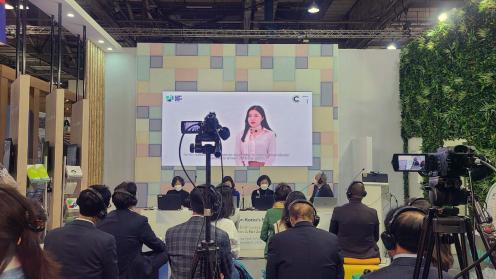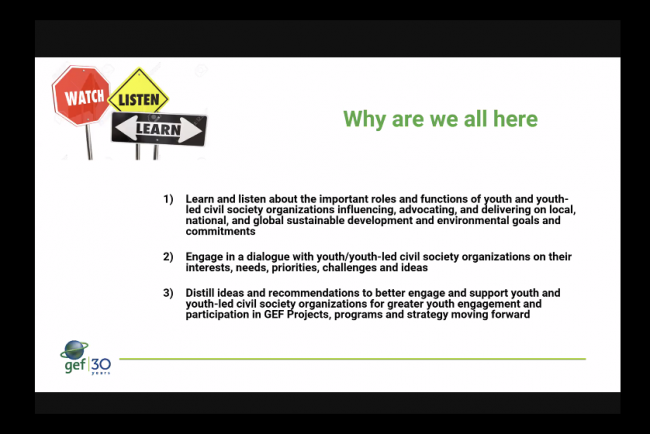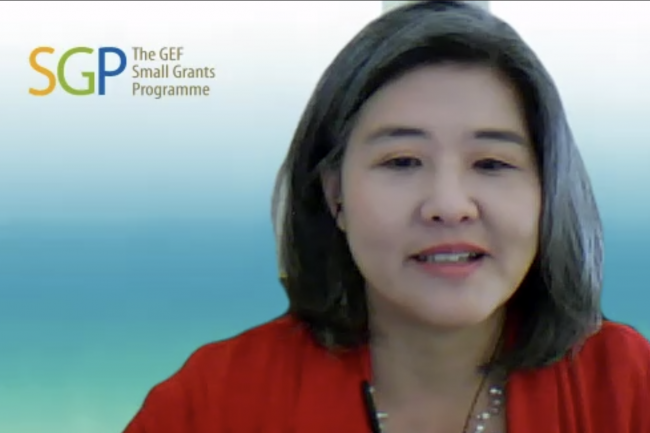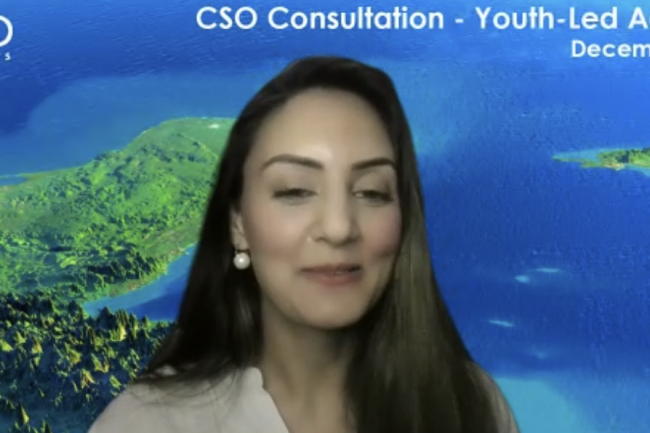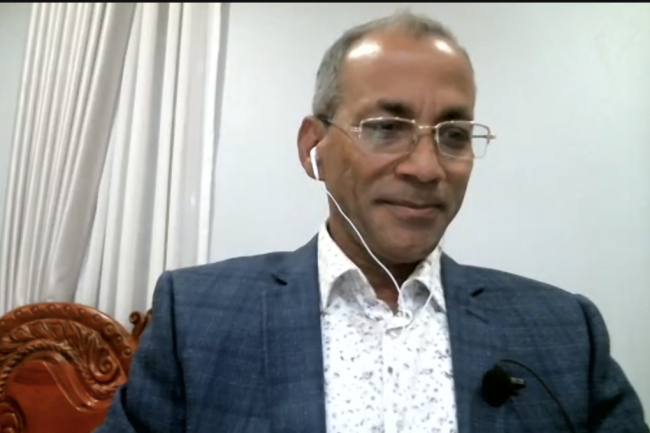GEF CSO Consultations on Youth-led Advocacy and Solutions to the Planet’s Environmental Crisis
Gabriella Richardson Temm, GEF Secretariat, opened the GEF CSO Consultations on 3 December 2021. She highlighted the event’s objective: to hear from youth leaders about the work they are undertaking and learn what can be done to better engage with youth and youth-led civil society organizations (CSOs) moving forward.
Opening Statements
Akhteruzzaman Sano, Chair, GEF CSO Network, highlighted recommendations from the GEF CSO Network regarding the eighth replenishment of the GEF Trust Fund (GEF-8), including: incorporate a multistakeholder dialogue platform in the GEF-8 architecture and fund global and regional projects on climate advocacy, literacy, and civic capacity building, led by the GEF CSO Network, with youth as a key target.
GEF CEO and Chairperson Carlos Manuel Rodríguez encouraged youth to aspire to be global leaders. He highlighted that the Small Grants Programme (SGP) complements the top-down financing approach and addresses the needs of youth and civil society. This consultation, he said, can give clear ideas for donors and the Secretariat to build capacity and influence financing on civil society priorities.
David Olarte, Ministry of Environment and Sustainable Development, Colombia, noted that youth make up around 50% of the global population and clearly understand the environmental challenges facing society. He showcased ways Colombia directly involves youth in climate negotiations and post-COVID-19 recovery consultations.
Keynote speaker Elizabeth Wathuti, Green Generation Initiative, Kenya, outlined her organization’s work encouraging children and youth to be environmentally conscious, such as the “adopt a tree” campaign. She said GEF Council Members should ask themselves whether their policy decisions are in the best interests of children and youth every time they take one. Wathuti also urged the GEF Secretariat to ensure the GEF and its decision makers take into account the interests of youth, and called for youth to have a meaningful voice at GEF Council meetings.
Yoko Watanabe, SGP, introduced the Youth in Action magazine, noting that it discusses inter-generational efforts. Pradeep Kurukulasuriya, Director and Executive Coordinator, Nature, Climate and Energy, UN Development Programme (UNDP), officially launched the publication and highlighted that it provides examples of youth leading scalable solutions.
Youth Dialogue and Discussions
Maria Leichner, Co-Chair, GEF CSO Network, moderated the panel, “Youth Innovations and Environmental Solutions Around the World,” reflecting on the possibilities of the future, especially the ability to connect youth and indigenous peoples around the world.
Alba Yacabalquiej, SGP Fellow, Guatemala, spoke about her education as a Mayan indigenous woman and her work as a fellow focusing on indigenous women’s empowerment and participation in project decision making.
Barsha Lekhi, SGP Indigenous Peoples Fellow, Nepal, highlighted her work with indigenous healers in Nepal to address the gap in documenting their practices and to provide solar dryers to enhance efficiency in the medicine drying process.
Chibeze Ezekiel, Strategic Youth Network for Development, Ghana, identified lessons learned from the youth-led movement to discourage the government from building coal plants and instead transition to renewable energy. He said the network is working to promote mainstreaming of climate action at the local level.
Maribel Santez Aguilar, Young Tseltal, Mexico, reflected on her village’s recent environmental concerns about waste and chemical soil contamination impacting their harvests. She highlighted community priorities to promote women’s rights and land tenure, culture and language preservation, and youth environmental training.
Errachid Montassir, High Atlas Foundation, Morocco, discussed lessons learned on community engagement and the gap between communities’ communication of their needs and the government’s success in meeting those needs. He said to address this gap, there must be trust building with the local communities and youth engagement in leadership and project management.
Isha Sharma, World Bank, moderated the “Discussion with Youth Advocates and Leaders Around the World.”
Kiefer Jackson, Caribbean Youth Environment Network, described her route to climate advocacy, explaining that the Network enables her to combine her legal qualifications with a passion for environmental protection.
Desmond Alugnoa, Co-Founder of the Green Africa Youth Organization, Ghana, presented on his organization’s work on the circular economy, disaster risk reduction, and climate change. He highlighted their tree planting campaign and a project to improve women’s access to education by providing potable water and female sanitary products to arid communities.
Derrick Mugisha, Regional Director Africa, Biodiversity Hub International, said his advocacy grew from witnessing the natural environment being destroyed and sold to developers. He described his organization’s work, such as providing food relief to rural communities during the COVID-19 lockdown.
Johnny Dabrowski, Co-founder of the Szkola Net 0 (Net Zero School), Poland, discussed his work to promote climate literacy, which he defined as incorporating information about law, just climate transitions, respect for nature, and active citizenship. He called for funding for climate literacy driven by youth.
In response to questions from the moderator, panelists emphasized the need to integrate young people throughout the process and not just when decisions are being implemented. In one-sentence summaries, the panelists said: Learn from us. Be persistent. Build your capacity. Do what you love and love what you do.
GEF CEO and Chairperson Carlos Manuel Rodríguez noted that youth present a threat to business as usual, “which is the point.”
Concluding Discussion
Saleem Ali, Scientific and Technical Advisory Panel (STAP), GEF, said he was encouraged by the increased attention that youth-based projects are receiving, and suggested that youth leaders:
- seek to mix sound science with their activism and continue learning; and
- approach issues from a systems perspective because it is crucial to make connections between sectors.
Hieu Tom Bui, Global Affairs, Canada, cautioned that society needs to be careful of elitism as those without a traditional academic education still have much knowledge to contribute. He noted calls for a redefinition of happiness and being able to speak your own tongue, among other recommendations, and said appeals to the heart like these spur decision making from world leaders.
Françoise Clottes, Director, Policy and Operations, GEF Secretariat, highlighted the need for more frequent interaction between the GEF, CSOs, and youth leaders. She highlighted the need to integrate youth, women, and indigenous community members through the entire decision-making process.
The GEF CSO Consultations concluded at 11:00 am EST.
To receive free coverage of global environmental events delivered to your inbox, subscribe to the ENB Update newsletter.
